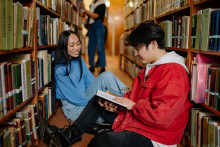Being ‘people-first’ is a central principle of the University of Twente. We think that Mr. Van der Sande’s piece about UT’s collaboration with Chinese universities is in diametric opposition opposed to that core value. He conflates the state actors with communities of scholars. He argues that UT researchers, who pursue the advancement of science for the benefit of humanity, should be denied the opportunity to collaborate with like-minded researchers from China because of the actions of the political institutions which govern them. He implies that the Chinese researchers, who play no role in governmental decisions, should be ostracised by the global academic community. It is not fair for Mr. Van der Sande to censure in this way all researchers collaborating with Chinese universities.
The cooperation between UT and Chinese universities is mutually beneficial and fruitful. It has produced many positive outcomes already, including 851 peer-review papers that have been published from 2004 to 2019 (according to ‘web of science’); some of them were published in high-level international journals, e.g., Advanced Materials, Physical Review Letters, and Nature Communications. These academic outputs would not be possible without the collaboration with many excellent Chinese universities.
It would also be a mistake to reduce research collaboration with Chinese universities to a pursuit of mere revenue and reputation. This collaboration ultimately benefits students and researchers. Collaborations with Chinese universities have created exchange programs that allow Chinese students to study at UT, also to learn about UT values and to experience the Dutch/European culture. Vice versa UT students can experience Chinese academia and culture by doing part of their study or research at Chinese universities. Without these exchange programs, some of us would not be here. We cherish this opportunity to work alongside the top scholars at UT, and we hope UT values us and our work too.
Furthermore, it saddens us to see Mr. Van der Sande characterize research outcomes as simply a boost in reputation for the university. Although the research output in the form of many papers, published in high-level journals produced by the collaborations, has undoubtedly elevated the UT’s stature, these outcomes also transcend the benefit of a single university and signify the scientific development of humanity as a whole.
For these reasons, we would like to express our objections against the negative and inaccurate portrayal of the collaboration between UT and Chinese universities that is given by Mr. Van der Sande. As members of the UT community, we firmly believe in the UT mindset of being open and inclusive. In a world under siege from tribal resentment and ethnic isolationism, the UT community must stay true to its principles and remain in its mission.
Written by: Group of Chinese PhDs studying at UT: Chen Weiqiu (ET), Jiao Zhen (TNW), Li Minsi (BMS), Wang Jie (ET), Ye Quanliang (ET), Zeng Ruosha (ITC), Zhang Zhiguo (TNW).








